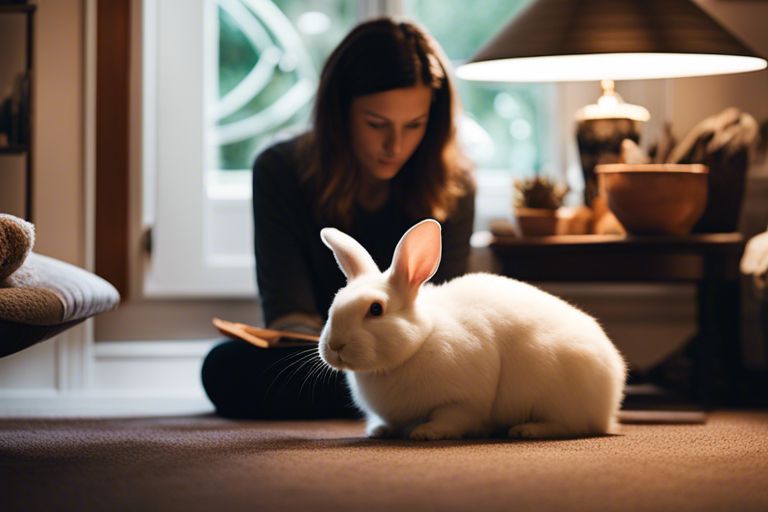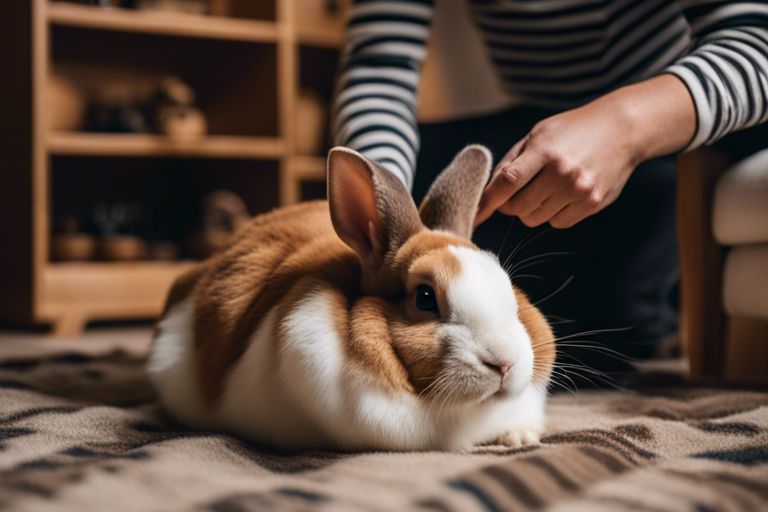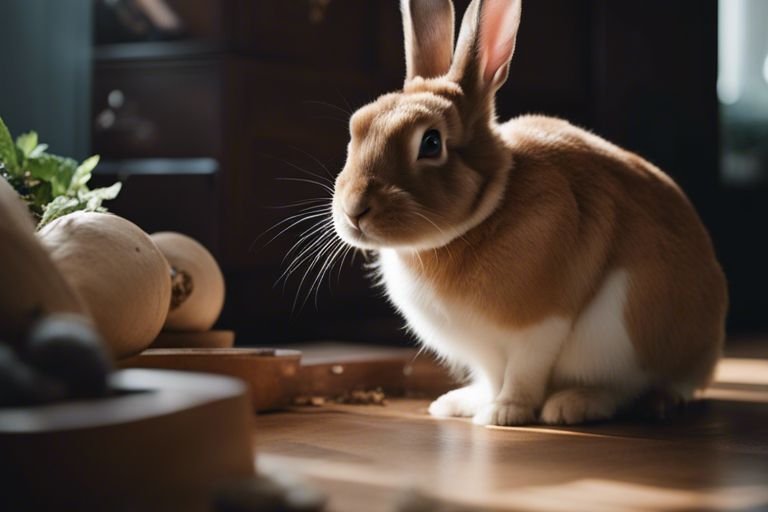Have you noticed your majestic Flemish Giant rabbit is shedding fur more than usual? While it’s normal for rabbits to shed, excessive fur loss can be a sign of underlying health issues that should not be ignored. There are several reasons why your rabbit may be losing fur, ranging from dietary deficiencies to parasites. In this informative blog post, we’ll explore the common causes of fur loss in Flemish Giant rabbits and provide actions you can take to address the issue and ensure your rabbit’s well-being.
Key Takeaways:
- Seasonal molting: Understand that Flemish Giant rabbits naturally shed their fur, especially in the spring and fall, as part of their seasonal molting process.
- Diet and grooming: Ensure your rabbit is receiving a balanced diet and regular grooming to prevent excessive fur loss and matting.
- Health check: Monitor your rabbit for any signs of skin irritation, parasites, or underlying health issues that may be causing fur loss, and consult a veterinarian if necessary.
- Environmental factors: Consider if any changes in your rabbit’s living environment, such as temperature or humidity, may be contributing to fur loss.
- Seek professional advice: If you are unsure about the cause of your Flemish Giant rabbit’s fur loss, or if it is excessive or accompanied by other concerning symptoms, seek guidance from a rabbit-savvy veterinarian.
Common Causes of Fur Loss in Flemish Giants
Clearly, noticing fur loss in your beloved Flemish Giant rabbit can be concerning. There are several factors that can contribute to fur loss in these majestic rabbits, including parasitic infections, hormonal imbalances, and environmental factors.
Parasitic Infections
To begin, parasitic infections such as mites and fleas can cause fur loss in Flemish Giants. These tiny pests can infest your rabbit’s fur and skin, causing itching, irritation, and ultimately leading to fur loss. If left untreated, these parasites can cause further discomfort and even lead to skin infections.
Hormonal Imbalances
Fungal infections, such as ringworm, can also be a culprit for fur loss in Flemish Giants. Ringworm is a highly contagious fungal infection that can affect a rabbit’s skin and fur, leading to patchy fur loss and skin irritation. Additionally, hormonal imbalances can also play a role in fur loss, especially during molting seasons. Loss of fur in patches or excessive shedding can be a sign of hormonal imbalances in your rabbit.
Loss of fur due to hormonal imbalances can be a natural process, but it is important to monitor your rabbit’s overall health to prevent any complications.
Environmental Factors
Ringworm, a fungal infection, can also be a result of poor environmental conditions. Environmental factors such as poor hygiene, overcrowding, and exposure to damp or dirty living spaces can contribute to the development of ringworm in Flemish Giants. Knowing how to maintain a clean and suitable living environment for your rabbit is crucial in preventing fur loss due to environmental factors.
Health issues such as stress, poor diet, and lack of proper grooming can also trigger fur loss in Flemish Giants due to environmental factors. It is essential to address these factors to ensure the overall well-being of your rabbit.
Diagnosis and Veterinary Care
For proper diagnosis and treatment of your Flemish Giant rabbit’s fur loss, it is essential to seek veterinary care. A rabbit’s fur loss could be a symptom of various underlying issues, such as mites, fungal infections, hormonal imbalances, or dental problems. Some cases may also be related to stress or dietary deficiencies. A veterinarian will be able to assess your rabbit’s overall health, conduct a thorough physical examination, and recommend the appropriate course of action.
If you notice any unusual changes in your rabbit’s fur, such as matting or bald patches, it is vital to seek professional advice promptly. Trying to address the issue without proper knowledge and guidance could potentially exacerbate the problem. Additionally, it is crucial to resist the urge to self-diagnose or self-medicate your rabbit, as this could have detrimental effects on their health. If you have specific questions or concerns about your rabbit’s fur loss, consult a trusted veterinarian or consider seeking expert advice online from platforms such as JustAnswer.
Recognizing Symptoms of Illness
Carefully observing your rabbit for any signs of illness is crucial in maintaining their well-being. Symptoms of illness in rabbits may include changes in behavior, reduced appetite, lethargy, abnormal feces, and visible discomfort. When it comes to fur loss, keep an eye out for any bald spots, excessive shedding, skin irritation, or changes in the quality and texture of their fur. If you notice any of these symptoms, it is important to seek veterinary attention promptly to address the underlying issue.
Diagnostic Tests for Fur Loss
Veterinary involvement is essential in determining the cause of fur loss in Flemish Giant rabbits. Your veterinarian may recommend various diagnostic tests, such as skin scrapings, blood work, or imaging studies, to identify the underlying cause of the fur loss. These tests will help accurately diagnose the problem and guide the appropriate treatment plan for your rabbit’s specific condition.
Any delay in seeking veterinary care for your rabbit’s fur loss could result in worsening of the condition or potential complications. Prompt action is crucial in addressing the issue and ensuring the well-being of your beloved pet.

Treatment and Management
Keep in mind that treating a Flemish Giant rabbit’s fur loss requires a comprehensive approach that includes medical treatments for parasites and infections, as well as improving your rabbit’s living conditions. By addressing both the underlying health issues and environmental factors, you can help your rabbit recover and prevent further fur loss.
Medical Treatments for Parasites and Infections
Treatment for fur loss caused by parasites or infections involves addressing the underlying cause. Your veterinarian may prescribe medication to eliminate parasites or antibiotics to clear up infections. It’s crucial to follow your vet’s instructions carefully and complete the full course of treatment to ensure the issue is fully resolved. Additionally, it’s essential to quarantine any affected rabbits to prevent the spread of parasites or infections to other animals.
Improving Your Rabbit’s Living Conditions
Your rabbit’s living conditions play a significant role in their overall health and fur condition. Ensure their enclosure is clean and spacious, with plenty of fresh hay and bedding. Additionally, provide a balanced diet with ample nutrients to support healthy fur growth. Regular grooming and handling can also help you monitor your rabbit’s fur and general health more closely.
Conditions such as stress and poor hygiene can contribute to fur loss in rabbits, so it’s crucial to create a peaceful and clean environment for your pet. Addressing these factors can help support your rabbit’s overall well-being and prevent future fur loss issues.
Prevention and Long-Term Care
To ensure the long-term health and well-being of your Flemish Giant rabbit, it is important to take proactive measures in their care and maintenance. By incorporating routine health checks and grooming tips into your rabbit care regimen, you can minimize the risk of fur loss and other health issues.
Routine Health Checks and Grooming Tips
Routine health checks are essential for monitoring the overall well-being of your Flemish Giant. This includes checking for any signs of fur loss, skin irritation, or abnormal behavior. Additionally, regular grooming sessions can help in preventing fur loss by removing loose fur and preventing matting. Some grooming tips include brushing your rabbit’s fur gently with a soft-bristled brush and trimming any long fur to prevent matting and tangling. Knowing the normal appearance and behavior of your rabbit is crucial in detecting any abnormalities early on.
Identifying and Addressing Early Signs of Issues
Checks for early signs of issues such as changes in appetite, weight loss, or excessive scratching are important in identifying potential health concerns before they escalate. Any changes in fur quality, such as dryness, flakiness, or bald patches, should also be monitored closely, as they can be indicative of underlying health issues. Regular veterinary check-ups can help in identifying and addressing any health issues in their early stages.
Long-term preventative measures such as maintaining a balanced diet, providing a spacious and clean living environment, and regular check-ups with a veterinarian specializing in small animals can contribute to the overall health and longevity of your beloved Flemish Giant rabbit.

Conclusion
Following this investigation into why your Flemish Giant rabbit is losing fur, it is important to consider potential causes such as stress, molting, poor diet, or underlying health issues. It is crucial to consult with a veterinarian to accurately diagnose the root cause of the fur loss and determine the best course of action. Additionally, ensuring a proper diet, regular grooming, and a stress-free environment can help prevent further fur loss and promote overall health. It is essential to address any concerns about your rabbit’s fur loss promptly to ensure their well-being and happiness.
FAQ
Q: What are the reasons my Flemish Giant rabbit is losing fur?
A: There are several reasons why your Flemish Giant rabbit may be losing fur, including molting, fur chewing, poor diet, stress, or underlying health issues. It’s important to closely examine your rabbit’s environment, diet, and overall health to determine the cause of the fur loss.
Q: What should I do if my Flemish Giant rabbit is losing fur?
A: If your Flemish Giant rabbit is experiencing fur loss, it’s important to take action promptly. First, ensure that your rabbit’s diet is balanced and includes plenty of hay, fresh vegetables, and a small amount of pellets. Next, carefully examine your rabbit for any signs of fur chewing or skin issues. If the fur loss is excessive or accompanied by other symptoms such as lethargy or changes in appetite, it’s crucial to seek veterinary care immediately.
Q: How can I help my Flemish Giant rabbit maintain a healthy fur coat?
A: To help your Flemish Giant rabbit maintain a healthy fur coat, it’s essential to provide a well-balanced diet, regular grooming, and a stress-free environment. Ensure that your rabbit has access to plenty of fresh hay, clean water, and a variety of vegetables. Additionally, regular grooming with a soft brush can help remove loose fur and prevent matting. Creating a calm and comfortable living environment for your rabbit can also contribute to a healthy fur coat.
